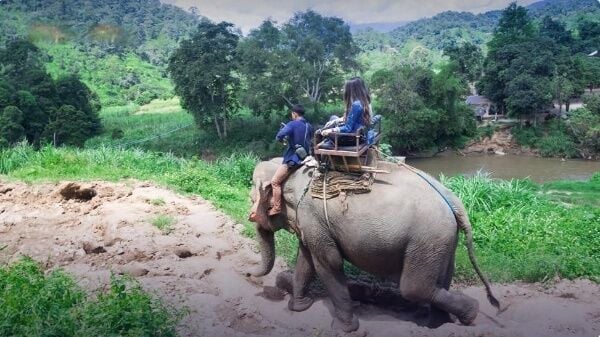Thailand’s tourism trunkated: Captive elephant breeding exposed

Thailand stands accused of a sinister practice: the captive breeding of elephants for its lucrative tourism industry. But the horrors extend far beyond just elephants.
Researchers have uncovered alarming findings, exposing the grim reality lurking behind the scenes of the wildlife entertainment industry.
In a study conducted by World Animal Protection (WAP), the scope of the issue is laid bare. An estimated 5.5 billion wild animals, spanning 487 species, endure cruel captivity worldwide, with elephants, bears, and lions among the most exploited.
Black bears, sun bears, and grizzly bears are subjected to farming across several Asian countries, while lions face similar fates in South Africa. Yet, it’s the elephants of Thailand that bear the brunt of this heart-wrenching tale.
WAP’s global campaigns director Nick Stewart remarked that these are long-lived, intelligent animals, farmed for arguably the most frivolous of industries: the wildlife entertainment industry.
Tourists, unknowingly fuelling this exploitation, shell out hefty sums for elephant riding and bathing experiences, contributing to an industry valued between US$581 million (approximately 20 billion baht) to US$770 million annually in Thailand alone.
As demand surges, so does the dark trade. The price of a single elephant can fetch a staggering US$50,000, driving poaching and smuggling to alarming heights.
But the cruelty doesn’t end there. Disturbing footage captured by WAP between 2018 and 2020 exposes the harrowing training methods employed by Thai mahouts, leaving behind a trail of trauma, reported The Nation.
Rather than pointing fingers solely at mahouts, WAP urges accountability to be placed on the tourism industry. They advocate for a ban on captive elephant breeding and the transformation of elephant parks into cruelty-free sanctuaries.
“It all comes back to this idea that animals born in captivity can be exploited more easily. We need to end this exploitation of wild animals, whether it’s legal or illegal.”
In related news, in a bid to promote responsible tourism and protect Thai elephants, the Tourism Authority of Thailand (TAT) continues to pledge unwavering support to the World Wide Fund for Nature (WWF) Thailand and its Travel Ivory Free initiative.
Latest Thailand News
Follow The Thaiger on Google News:


























